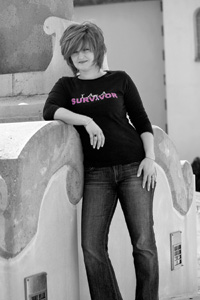HER2+ Breast Cancer Survivor
Survivor Provides Care and Beauty to Fellow Survivors
 For Tina Herold, losing her hair because of chemotherapy became the emotional confirmation that she really did have cancer. She had been diagnosed two months earlier, at the age of 34, with Stage II invasive ductal breast cancer (HER2 and hormone positive). When she went to buy a wig and couldn’t find anyone that she felt seemed to care, she decided she needed to do something. Two years later, in 2008, she opened Wigged Out — a wig boutique with personalized service for patients with cancer (www.imwiggedout.com).
For Tina Herold, losing her hair because of chemotherapy became the emotional confirmation that she really did have cancer. She had been diagnosed two months earlier, at the age of 34, with Stage II invasive ductal breast cancer (HER2 and hormone positive). When she went to buy a wig and couldn’t find anyone that she felt seemed to care, she decided she needed to do something. Two years later, in 2008, she opened Wigged Out — a wig boutique with personalized service for patients with cancer (www.imwiggedout.com).
Tina is also devoted to her cancer volunteer work, she has been twice honored by these organizations. She was given the 2009 Jana Peters “Life is Good” award from the Young Survival Coalition, and also was selected as one of 28 Heroes of Hope 2010 for the High Plains division of the American Cancer Society. She and her husband, Scott, have two girls, and live in Overland Park, Kan.
After my first chemotherapy treatment, the thing I had dreaded most began to happen: my hair started to fall out. I had hoped to be among the 1% who didn’t lose their hair during chemo, but on Christmas morning 2006, it was coming out in handfuls. I sat on the floor of my shower and cried. My sweet husband, Scott, found me and he knew it was time to shave it off. So, wanting our daughters to be a part of my cancer journey, rather than to be afraid of it, I gave them round-tipped scissors and invited them to cut off my hair. Scott then shaved my head. I cried some more, but when I put on my wig, it was better than I expected. At the time, I had no idea that this would be the beginning of a new calling for me.
Frankly, I did not handle being diagnosed with cancer very well. I had always been a strong, independent woman, but when my breast surgeon told me the news, I was in complete shock. All I could think of was dying and leaving two small girls with no mommy. I just fell apart and couldn’t eat or sleep for a week. Antidepressants eventually helped somewhat in the beginning, but it was very difficult for me.
My tumor was small, only eight millimeters, and was located up above my left breast. I didn’t even know it was considered breast tissue that high on my chest, and one of my missions has become to educate women about this. After reviewing my options, talking with Scott, and praying, I elected to have a lumpectomy followed by radiation and chemotherapy. I know it sounds crazy but I knew I could not start chemo until I had a wig. Scott, the kids and I went shopping and went to three wig stores. It seemed that every place we went, no one helped us and I knew nothing about wigs. I felt very alone and scared. We finally found one in Oregon, but the whole experience was awful.
It doesn’t seem rational that I was more worried about my hair than my life, but I was only 34 years old when I was diagnosed. There was no cancer in my family. I was thin, healthy, exercised regularly, kept our home chemical free, and was nearly obsessive about eating nutritious foods. At the time, I felt embarrassed and ashamed that I had done something wrong and had caused this to happen. I know differently now.
Before my oncologist would even let me start the chemotherapy, which I was very reluctant to do anyway, he told me I had to see a therapist. I was reacting so emotionally to my cancer diagnosis that he was concerned. This was a turning point for me. My therapist helped me refocus my thoughts, change my attitude and see how horrible I was acting. When I finally got my mind okay with what was going on — the fighter in me came back. I actually began to enjoy chemotherapy, as it became my chance to fight back and kill the cancer.
We moved to Kansas City the day I finished my chemo, and I was fortunate to find another terrific oncologist. I underwent radiation treatments, but my oncologist also noted that my HER2 positive numbers were extremely high. None of her patients with those same high levels were still alive. When I asked her advice, she recommended taking a maintenance drug, which I believe saved my life. I took it every three weeks for two years. She monitored me carefully, but I told her I would do anything to be able to raise my girls. I also began taking two other drugs for five years in 2007 because my cancer was hormone positive.
I tell people that having cancer is the best thing that ever happened to me. Opening Wigged Out has allowed me to help so many women, and I am blessed that they have invited me to be a part of their lives. I’m very candid with them about how poorly I reacted to my diagnosis and share with them much of what my therapist taught me. You have to live for today and fight like crazy. Cancer is awful, but if you can think of it with a positive spin, you will have a different journey.


